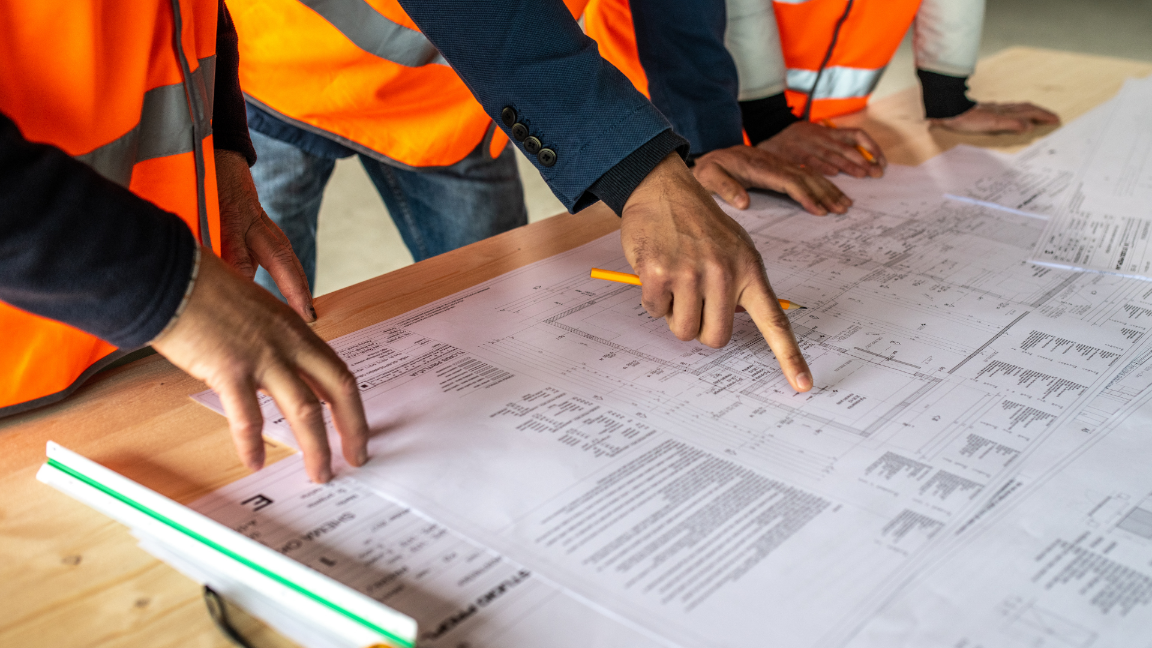Building Your Career: Construction Project Manager
Ever wondered what it takes to transform an empty plot into a finished building? That's where Construction Project Managers come in. They're the driving force behind every successful construction project, guiding builds from the first foundation to the final finishing touches.

What Does a Construction Project Manager Do?
Think of a Construction Project Manager as the conductor of a very complex orchestra - except instead of musicians, you're coordinating architects, engineers, contractors, and clients.
You'll be the person making sure everyone hits the right notes at the right time, whether you're working on new homes, office blocks, or major infrastructure projects.
Key Responsibilities in Construction Project Management
Your typical day might see you jumping from site visits to client meetings, tackling challenges as they arise.
Here's what you'll be responsible for:
On-site leadership, working directly with construction teams to solve problems and maintain quality standards
Budget management and cost control, ensuring projects stay financially on track
Health and safety oversight, maintaining strict compliance with all regulations
Contractor selection and management, building and coordinating effective teams
Client communication, delivering regular updates and managing expectations
Essential Skills and Qualifications
While there's no single path to becoming a Construction Project Manager, most employers look for a mix of qualifications and practical know-how. You might start with a degree in construction management, civil engineering, or building studies, or work your way up through a Higher National Diploma (HND) in construction subjects. Many successful managers also pick up professional certifications along the way to show they know their stuff.
But it's not just about the paperwork - you'll need to be a real people person with technical skills to match. That means being able to explain complex issues simply, solve problems on the fly, and keep up with the latest building regulations and construction methods.
Growing Your Career
Nobody starts at the top - most Construction Project Managers begin their journey as site supervisors or assistant managers, learning the ropes before taking charge of their own projects. Want to fast-track your progress? Consider joining industry bodies like the Chartered Institute of Building (CIOB) or Royal Institution of Chartered Surveyors (RICS). They're great for networking and offer training that can really boost your career. Many professionals also choose to work on a contract basis between projects, allowing them to gain experience across different sectors and specialties - from residential developments to commercial builds and infrastructure projects.

What Can You Earn?
Construction Project Management offers structured salary progression based on experience and project scope. Entry-level positions typically start at £35,000, with experienced managers earning £65,000 or more annually. Senior positions managing major projects can command salaries exceeding £80,000. The sector's continued growth, combined with increasing demand for sustainable construction expertise, means competitive salaries remain a key feature of the role. Your earning potential will typically increase with additional qualifications and proven project delivery experience.
For those interested in contract work, day rates can range from £350-£550 depending on experience and project complexity. This flexible approach allows you to command higher rates while choosing projects that align with your expertise and career goals.
The sector's continued growth, combined with increasing demand for sustainable construction expertise, means competitive salaries remain a key feature of the role. Your earning potential will typically increase with additional qualifications and proven project delivery experience.
Your Working Environment
If you like variety in your work, you're in luck. One day you might be on site in your hard hat, checking progress and solving problems. The next, you could be in the office, planning future phases or meeting with clients.
While you'll generally work regular business hours, construction can be unpredictable. You might need to stay late to handle an urgent delivery or come in early for an important concrete pour, but there's nothing quite like the satisfaction of watching a building you've managed take shape from the ground up.
Job Outlook
The construction industry is poised for significant expansion. According to the Construction Skills Network (CSN), the sector is set for a strong comeback, with 1.6% growth predicted for 2025 followed by 2.3% in 2026. Infrastructure projects currently look to be the highest growth sector, with an average growth rate of 4.2% per year up to 2029. This is closely followed by new public housing, with an average annual growth rate of 3.4% This growth isn't just about building more - it means increasing demand for skilled Construction Project Managers at every level.
For experienced professionals, this expansion creates opportunities to take on larger projects or move into specialized sectors. If you're new to the industry, there's never been a better time to start your journey. The continued need for skilled workers, combined with retirement rates in senior positions, means companies are actively investing in developing new talent.
This growth trend signals excellent career stability and advancement opportunities. Whether you're looking to progress in permanent roles or explore contract positions, the industry's positive outlook means your project management skills will be in high demand for years to come.

Ready to Build Your Career?
Here's how to get started on your journey:
Get qualified in construction or engineering
Build hands-on experience in entry-level roles
Develop your project management skills
Join professional bodies for training and networking
Looking to take your first step into Construction Project Management? Or ready to move up to your next challenge? Our specialist construction team works with the UK's top construction companies, and we'd love to help you find your perfect role. Get in touch today and let's build your future together.


